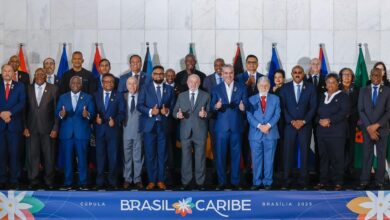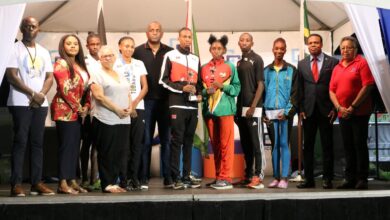CARICOM Youth Ambassadors (CYAs) and regional youth leaders spent four engaging days (23-26 April) at the CARICOM Secretariat in Georgetown, Guyana, where they built their capacity to effect change on climate change and health issues. As part of the Pan American Health Organisation’s (PAHO) Climate Change and Health Project (CCH), young leaders across the Region are receiving education, funding, and training to create and implement projects in their communities that will address these critical issues. The Climate Change and Health Orientation and Training was one of the activities in the suite of initiatives happening throughout 2024 and 2025.
Youth leaders underwent training in proposal and grant writing, project management and implementation, and climate and health advocacy. Coordinated by Michele Small-Bartley, Deputy Programme Manager, Youth Development, CARICOM Secretariat, the training focused on helping young leaders gain the necessary knowledge and experience in conceptualising, planning, proposing, and implementing local and regional climate change and health justice projects.


Participants discuss climate action, health, and overcoming barriers to engagement
Youth leaders and climate experts participated in a panel discussion that addressed regional and global governments’ roles in addressing climate change and health; collaboration among governments, civil society, and youth-led initiatives; the challenges and barriers young people face when engaging with local leaders on climate change and health issues and how youth can contribute to national efforts to address climate change and mental health.
Panellists highlighted youth involvement as key to the change required for effective policy creation and successful intergenerational collaboration. Shaquawn Gill, President of the University of Guyana’s Students’ Society, urged governments to add more youth voices to their decision-making:
“Young people aren’t in the right rooms to make the right changes. We have a lot of talk shops, but when it’s time for us to be in the room for changes to happen, young people are often left out. Government must make sure that young people are part of the decision-making process. They must take a steady and steadfast approach to involving young people.”
Shaquawn Gill, President of the University of Guyana’s Students’ Society

Youth Leaders benefitted from networking and knowledge-sharing
Throughout the week, the participants highlighted how the interaction among the group positively affected the workshop sessions. “I love the level of engagement,” said Melanie Lubin, Saint Lucia’s CYA, “We’re learning a lot more about each other and our cultures. [We’re also] making comparisons on how we can enhance the projects and some of the issues we face in our countries in terms of climate change and health.”
Iana Franks, St Kitts and Nevis’ CYA, also lauded the collaboration and camaraderie among the group. “I’m very happy to be among young people from CARICOM Member States,” she expressed. “This is an amazing opportunity to discuss ideas with each other and learn from each other. We all have the same goal and mission, which is to be involved in youth development. Communicating with and being around them is a great opportunity.”
That close interaction was key to many of the participants’ outlook on the sessions, as well as their confidence in their ability to use their new knowledge at home. Jenaude Porter, CYA for St Vincent and the Grenadines, stated, “I’ve been learning a lot about climate change and health and what it can do for us as a people.” He ended with a call to action for young people and the Region: “If we as a people come together, we can save our nations and the world as a whole.”
Under the CCH project, in the next 12 months, the CYAs and youth leaders who attended the training will implement climate change and health activities in their home countries and represent their peers at workshops, conferences, and symposia related to climate justice and health advocacy.



This content is provided under the CARICOM Secretariat’s Climate Change and Health Programme (CCHP) in collaboration with the Pan American Health Organization (PAHO) with support from the European Union (EU).
The CCHP’s mission is to increase education on how climate change affects health and spread awareness on prevention and adaptation measures to reduce greenhouse gasses.





